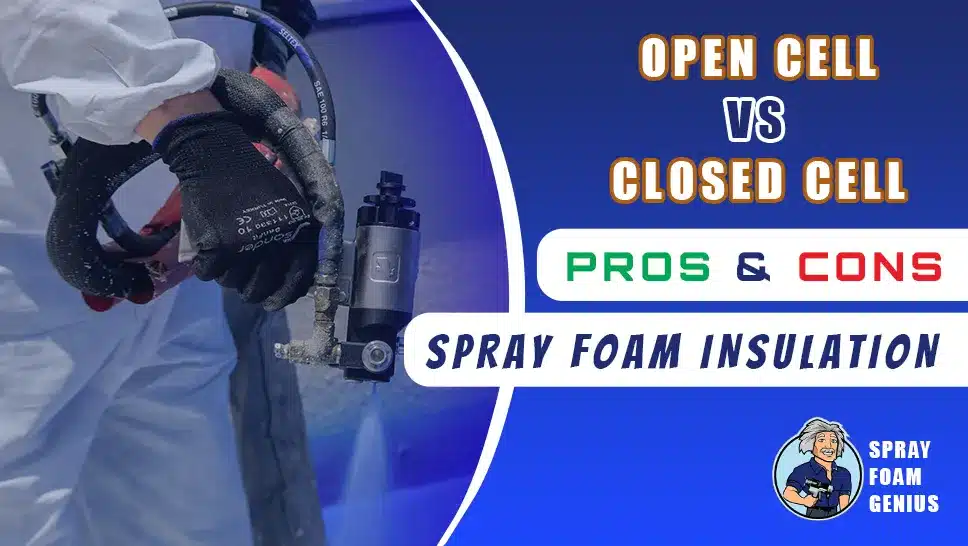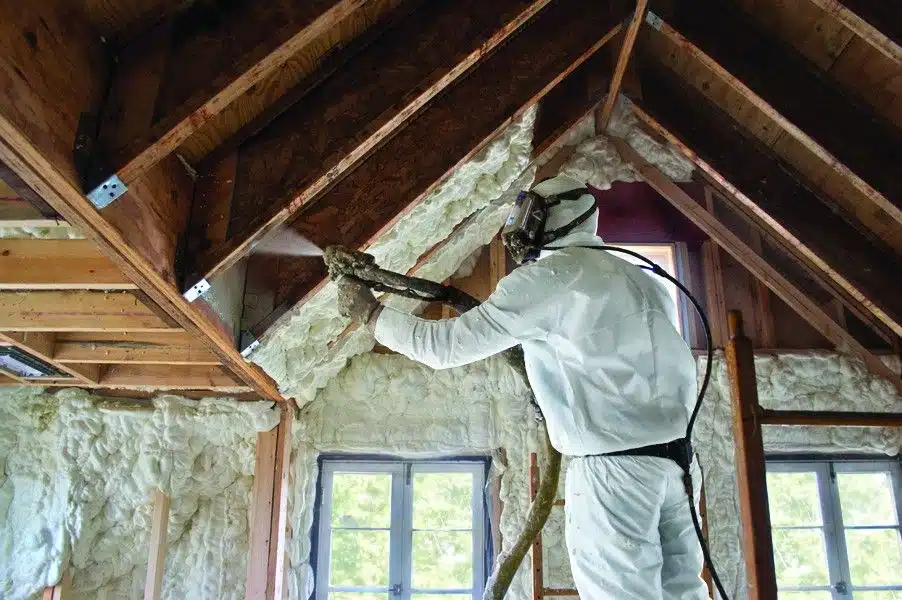
When it comes to choosing the right insulation for your home or business, spray foam insulation is often considered the gold standard. However, deciding between open-cell and closed-cell spray foam insulation can be a challenging task. Each type has its unique advantages and drawbacks, and the best choice depends on your specific needs, location, and budget. In this blog post, we will break down the pros and cons of both open-cell and closed-cell spray foam insulation to help you make an informed decision.
What is Spray Foam Insulation?
Spray foam insulation is a type of insulation that is applied as a liquid and then expands to form a solid, airtight barrier. It is commonly used in residential, commercial, and industrial settings to improve energy efficiency by reducing air leakage and providing thermal insulation. There are two main types of spray foam insulation: open-cell and closed-cell. Understanding the differences between these two can help you select the most suitable option for your project.
Open Cell Spray Foam Insulation
What is Open Cell Spray Foam Insulation?
Open-cell spray foam insulation is characterized by its sponge-like structure, where the cells of the foam are not fully encapsulated, leaving tiny pockets of air within the material. This type of spray foam is typically softer and more flexible than its closed-cell counterpart.
Pros of Open Cell Spray Foam Insulation
1. Cost-Effective
One of the most significant advantages of open-cell spray foam is its cost-effectiveness. It is generally cheaper to produce and install compared to closed-cell foam, making it an attractive option for budget-conscious homeowners.
2. Sound Absorption
Open-cell spray foam excels at soundproofing. Its porous structure helps to dampen noise, making it an excellent choice for interior walls, ceilings, and floors where sound control is a priority.
3. Expands More
This type of foam expands significantly more than closed-cell foam, making it easier to fill small cracks, crevices, and hard-to-reach areas. This expansive nature ensures a more thorough coverage, reducing air leakage effectively.
4. Breathability
Open cell foam is more breathable, which can be beneficial in certain climates. It allows moisture to pass through, reducing the risk of mold growth caused by trapped moisture. This breathability makes it a preferred option for attics and walls in areas with high humidity.
Cons of Open Cell Spray Foam Insulation
1. Lower R-Value
The R-value, which measures the insulation’s ability to resist heat flow, is lower for open-cell foam compared to closed-cell foam. This means it may not provide the same level of thermal insulation, making it less ideal for extremely cold climates.
2. Vulnerability to Water
Open-cell spray foam can absorb water due to its porous structure, which can lead to mold and mildew if exposed to moisture over time. This makes it less suitable for areas prone to flooding or heavy rainfall.
3. Structural Integrity
Unlike closed-cell foam, open-cell foam does not provide significant structural support. It is softer and less dense, which means it cannot reinforce walls or roofs to the same extent.
Closed Cell Spray Foam Insulation
What is Closed Cell Spray Foam Insulation?
Closed-cell spray foam insulation is denser and more rigid than open-cell foam. The cells within the foam are fully encapsulated, creating a barrier that is impermeable to air and water. This results in a stronger, more durable form of insulation that can be used in a wider range of applications.
Pros of Closed Cell Spray Foam Insulation
1. Higher R-Value
Closed-cell spray foam offers a higher R-value per inch, making it one of the most effective types of insulation on the market. This high thermal resistance makes it ideal for extreme climates where maintaining temperature control is crucial.
2. Water Resistance
Unlike open-cell foam, closed-cell spray foam is water-resistant. Its impermeable structure prevents water from being absorbed, making it an excellent choice for areas prone to moisture, such as basements, crawl spaces, and exterior walls.
3. Adds Structural Strength
Closed-cell foam is much denser than open-cell foam, and it hardens into a rigid material that can add structural strength to walls, roofs, and other surfaces. This makes it a preferred option for load-bearing applications and areas susceptible to strong winds or seismic activity.
4. Air Barrier
Closed cell foam creates an effective air barrier that significantly reduces air leakage, enhancing the energy efficiency of a building. This can lead to substantial savings on heating and cooling costs over time.
Cons of Closed Cell Spray Foam Insulation
1. Higher Cost
The most significant drawback of closed-cell spray foam is its cost. It is more expensive to produce and install, which can make it less accessible for some homeowners and businesses.
2. Less Flexible
Due to its rigid nature, closed-cell foam is less flexible than open-cell foam. This can make it challenging to install in areas with irregular shapes or where movement and flexibility are required.
3. Vapor Barrier Concerns
In certain climates, the impermeability of closed-cell foam can create concerns related to moisture vapor barriers. If not installed correctly, it can trap moisture within walls, potentially leading to mold growth. Proper ventilation and installation are crucial to avoid this issue.
Comparing Open Cell and Closed Cell Spray Foam Insulation

Cost Comparison
When comparing the costs, open-cell spray foam is the more budget-friendly option. However, while closed-cell foam is more expensive, it offers a higher R-value and additional benefits like water resistance and structural support. Therefore, while the upfront cost is higher for closed-cell foam, the long-term benefits may justify the investment, particularly in extreme climates or areas where structural reinforcement is needed.
Thermal Performance
Closed-cell spray foam offers superior thermal insulation due to its higher R-value, making it the better choice for extreme weather conditions. Open cell foam, while still effective, may require additional layers to achieve the same thermal performance, which can offset some of its cost advantages.
Soundproofing
If soundproofing is a primary concern, open-cell spray foam has the edge. Its porous structure is more effective at absorbing sound, making it ideal for interior spaces where noise reduction is essential.
Moisture Resistance
For areas prone to moisture, such as basements, crawl spaces, or exterior walls, closed-cell foam is the clear winner. Its water-resistant properties make it a better choice in these environments, whereas open-cell foam’s tendency to absorb water could lead to problems like mold and mildew.
Application Versatility
Closed-cell spray foam is more versatile in terms of application. Its structural rigidity and water resistance make it suitable for a wider range of environments, including exterior applications and areas where additional structural support is required. Open cell foam, on the other hand, is better suited for interior applications where flexibility, soundproofing, and cost-effectiveness are priorities.
Making the Right Choice for Your Home or Business
Choosing between open-cell and closed-cell spray foam insulation ultimately depends on your specific needs, budget, and the environmental conditions of your location. If you’re looking for a cost-effective solution that offers soundproofing and is ideal for interior spaces, open-cell spray foam may be the right choice. However, if you need superior thermal performance, water resistance, and added structural strength, closed-cell spray foam is likely the better option.
At Spray Foam Genius Marketing, we specialize in helping spray foam insulation contractors connect with homeowners and businesses looking to improve their energy efficiency. Whether you’re a contractor looking to grow your business or a homeowner in need of expert advice, we’re here to help. Our team of professionals can provide you with the information and services you need to make the best decision for your insulation needs.
Ready to explore your options? Contact us today at 877-840-FOAM for USA and 844-741-FOAM for Canada, visit our website at https://sprayfoamgeniusmarketing.com, or email us at [email protected].
Let us help you find the perfect insulation solution for your home or business.
- How to Use Pinterest to Market Your Spray Foam Insulation Services - December 27, 2023
- How to Use LinkedIn to Grow Your Spray Foam Insulation Business - December 23, 2023
- How to Use Instagram to Showcase Your Spray Foam Insulation Projects - December 16, 2023

